

Il s'adresse aux grandes curieuses et aux grands curieux, ainsi qu'aux personnes malades.
Cette bibliographie n'a pas vocation à être exhaustive : j'y partage uniquement mes lectures. Elle ne remplace pas une review : je ne suis ni chercheuse, ni médecin, ni journaliste. Enfin scoop : il n'existe pas de traitement du covid long faisant consensus scientifique : vous n'en trouverez pas ici.
Je vous souhaite une bonne lecture.
Immune determinants of COVID-19 disease presentation and severity - Nature Medicine. Déterminants immunitaires de la présentation et de la gravité de la maladie COVID 19. Découverte d'un nouveau mécanisme de transmission du SARS-CoV-2. Derrière la dissémination virale du Covid-19, il reste encore de multiples zones d'ombre sur les évènements moléculaires.

Mais chaque jour amène son lot de découvertes. Comment le SARS-CoV-2 évolue pour échapper à notre système immunitaire. Estradiol, Progesterone, Immunomodulation, and COVID-19 Outcomes. Estradiol, Progesterone, Immunomodulation, and COVID-19 Outcomes. Natural products may interfere with SARS-CoV-2 attachment to the host cell. Natural products may interfere with SARS-CoV-2 attachment to the host cell. SARS-CoV-2 has been emerged in December 2019 in China, causing deadly (5% mortality) pandemic pneumonia, termed COVID-19.
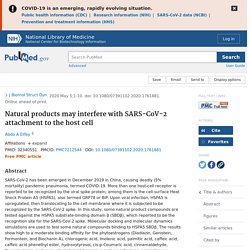
More than one host-cell receptor is reported to be recognized by the viral spike protein, among them is the cell-surface Heat Shock Protein A5 (HSPA5), also termed GRP78 or BiP. Sex Hormones and Novel Corona Virus Infectious Disease (COVID-19) Sex Hormones and Novel Corona Virus Infectious Disease (COVID-19) Given the rapid spread of the coronavirus disease 2019 (COVID-19) pandemic and its overwhelming effect on health care systems and the global economy, innovative therapeutic strategies are urgently needed.
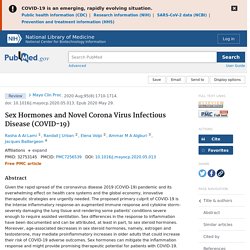
The proposed primary culprit of COVID-19 is the intense inflammatory response-an augmented immune response and cytokine storm-severely damaging the lung tissue and rendering some patients' conditions severe enough to require assisted ventilation. Sex differences in the response to inflammation have been documented and can be attributed, at least in part, to sex steroid hormones. Is oestrogen protective against COVID-19 ? Is oestrogen protective against COVID-19? - Hospital Pharmacy Europe. An emergent fact from two recent studies of patients with COVID-19 was that a higher proportion of men (56.9%1 and 56.9%2) were infected.
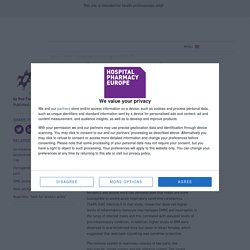
This imbalance in gender susceptibility raises an important question over whether being male leads to an inherently greater risk of infection or conversely whether being female confers some degree of protection. Recent research prior to the current pandemic appears to suggest that the latter is true. In other words, it is becoming increasingly clear that there are gender differences in the response to infections and that oestrogens would appear to have a protective effect on the immune system. In fact, it has been observed that for all cancers outside of the reproductive tract, there is a two-fold higher risk of malignancies in males.3 The immune system in mammals consists of two parts: the non-specific, innate system and the adaptive system.
COVID-19 patients still have symptoms 6 months later; interferon may be helpful treatment after all. Une arme à double tranchant contre le Covid-19. Lorsque le système immunitaire combat les virus, le timing est essentiel, particulièrement lorsqu’il s’agit de lutter contre les formes sévères, voire mortelles, de Covid-19.

En effet, plusieurs études récentes suggèrent que le moment où agissent des protéines nommées interférons est un paramètre critique pour leur efficacité contre le SARS-CoV-2. Ces protéines immunitaires, au cœur de nombreuses recherches en tant que traitements potentiels, refrènent la réplication virale au début de la maladie. Reduced numbers of T cells and B cells correlates with persistent SARS-CoV-2 presence in non-severe COVID-19 patients. This retrospective investigation was designed to examine immunological characteristics of non-severe COVID-19 patients with persistent viral presence.
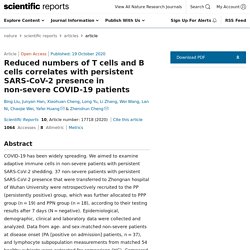
We reported here that despite their alleviated symptoms and much improved laboratory findings, these patients demonstrated significantly lower numbers of T cells and B cells than healthy controls, and than those turned negative for viral RNA. 37 non-severe COVID-19 patients with persistent viral presence were included in this study and were allocated to the PP group. Multiple symptoms, including fever, dry cough, dyspnea, expectoration, diarrhea, pharyngalgia, hemoptysis and weep tears were recorded at disease onset (Table 1), and most of these patients were abnormal in radiographic examination (data not shown). Upon treatment in mobile cabin hospitals and transferred to our hospital, they turned almost asymptomatic with much improved laboratory findings, as showed in Table 2 and compared with those in the PA group. Clinical characteristics of re-hospitalized COVID-19 patients with recurrent positive SARS-CoV-2 RNA: a retrospective study.
SARS-CoV-2 recurrent RNA positivity after recovering from coronavirus disease 2019 (COVID-19): a meta-analysis. Severe clinical relapse in an immunocompromised host with persistent SARS-CoV-2 infection. Whether people who have recovered from COVID-19 can be re-infected by SARS-CoV-2 is a matter of debate.
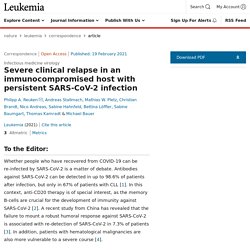
Antibodies against SARS-CoV-2 can be detected in up to 98.6% of patients after infection, but only in 67% of patients with CLL [1]. Vaccine may ease long Covid suffering. Anecdotal reports that people with “long Covid” are making dramatic recoveries after being vaccinated are intriguing and should be followed up with formal studies, scientists said yesterday.
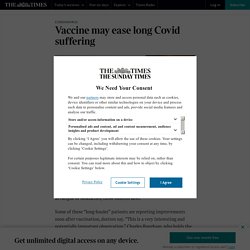
Most people recover from Covid-19 quickly but official figures show that one in ten who test positive still have at least one symptom, such as fatigue or headaches, three months later. Some of these “long-hauler” patients are reporting improvements soon after vaccination, doctors say. “This is a very interesting and potentially important observation,” Charles Bangham, who holds the chair in immunology at Imperial College London, said. “At present these are just anecdotes, and systematic studies would be needed, but anecdotes can sometimes point the way to important discoveries.” The causes of long Covid are not known but one. COVID-19 Virus May Prompt Body to Attack Itself.
L’auto-immunité à l’origine de cas sévères de Covid-19 ? Diverse Functional Autoantibodies in Patients with COVID-19. Prothrombotic autoantibodies in serum from patients hospitalized with COVID-19. COVID-19 and Immunological Dysregulation: Can Autoantibodies be Useful? Autoantibodies against type I IFNs in patients with life-threatening COVID-19. Cerebrospinal fluid findings in COVID-19 indicate autoimmunity - the lancet. Covid-19 hyperinflammation and post-Covid-19 illness may be rooted in mast cell activation syndrome. Covid-19 hyperinflammation and post-Covid-19 illness may be rooted in mast cell activation syndrome.
COVID-19 and Multisystem Inflammatory Syndrome, or is it Mast Cell Activation Syndrome? Mast cells activated by SARS-CoV-2 release histamine which increases IL-1 levels causing cytokine storm and inflammatory reaction in COVID-19. Samed DG et SD grossin daens. Centre de référence des mastocytoses (CEREMAST) - Site internet maladies rares de l'hôpital Necker. Pediatric mastocytosis: long term follow up of 53 patients with whole sequencing of KIT.
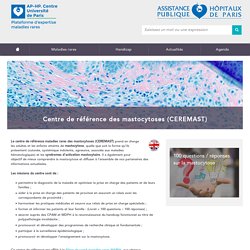
A prospective study. Méni C, Georgin-Lavialle S, Le Saché de Peufeilhoux L, Jais JP, Hadj Rabia S, Bruneau J, Fraitag S, Hanssens K, Dubreuil P, Hermine O, Bodemer C. Br J Dermatol. 2018 May 22. Masitinib for treatment of severely symptomatic indolent systemic mastocytosis: a randomised, placebo-controlled, phase 3 study. Syndrome d'activation mastocytaire. Le syndrome d'activation mastocytaire (SAMA), communément appelé troubles de l'activation mastocytaire (MCAS en anglais), est une pathologie immunologique dans laquelle les mastocytes libèrent de façon inappropriée et excessive des médiateurs chimiques, provoquant un ensemble de symptômes chroniques, y compris le choc anaphylactique, ou un état approchant[1],[2],[3].
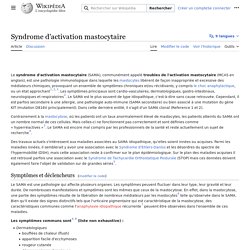
What can neuroimmunology teach us about the symptoms of long-COVID? We use cookies to enhance your experience on our website.By continuing to use our website, you are agreeing to our use of cookies. You can change your cookie settings at any time. <a href=" Find out more</a> Skip to Main Content Advertisement.
Des résultats confirment la capacité du SARS-CoV-2 à infecter les neurones. En 3d par imagerie en feuillet de lumière, présence du virus dans les neurones du bulbe olfactif. © Nicolas Renier. Covid linked to risk of mental illness and brain disorder, study suggests. One in eight people who have had Covid-19 are diagnosed with their first psychiatric or neurological illness within six months of testing positive for the virus, a new analysis suggests, adding heft to an emerging body of evidence that stresses the toll of the virus on mental health and brain disorders cannot be ignored.
The analysis – which is still to be peer-reviewed – also found that those figures rose to one in three when patients with a previous history of psychiatric or neurological illnesses were included. It found that one in nine patients were also diagnosed with things such as depression or stroke despite not having gone to hospital when they had Covid-19, which was surprising, said the lead author, Dr Max Taquet of the department of psychiatry at the University of Oxford. Overall, Covid-19 was associated with increased risk of these diagnoses, but the incidence was greater in patients who required hospital treatment, and markedly so in those who developed brain disease.
COVID long : le vécu des patients corroboré par l’imagerie cérébrale. Ils pensaient être tirés d’affaire, s’en être sortis sans trop de dommages, ayant développé une forme modérée de la COVID-19 dont ils s’étaient apparemment remis. Association between antidepressant use and reduced risk of intubation or death in hospitalized patients with COVID-19: results from an observational study. Setting We conducted a multicenter observational retrospective study at AP-HP, which includes 39 hospitals of which 23 are acute, 20 are adult and 3 are pediatric hospitals.
We included all adults aged 18 years or over who have been admitted with COVID-19 to these medical centers from the beginning of the epidemic in France, i.e. January 24th, until April 1st. [Ce post fait etat de la recherche selon... - Albert Moukheiber. Anxiety and depression in COVID-19 survivors: Role of inflammatory and clinical predictors. Infection-triggered perturbation of the immune system could induce psychopathology, and psychiatric sequelae were observed after previous coronavirus outbreaks. The spreading of the Severe Acute Respiratory Syndrome Coronavirus (COVID-19) pandemic could be associated with psychiatric implications. Traiter l’inflammation chronique pourrait soigner les maladies psychiatriques. L’émergence de nouvelles études portant sur la relation entre le système immunitaire, l’inflammation, le stress et le cerveau montrent que certaines maladies considérées jusqu’à présent comme étant exclusivement psychiatriques pourraient aussi avoir une explication neurologique.
C’est le cas de la schizophrénie, des troubles du spectre de l’autisme, des troubles bipolaires ou encore de la dépression dont la cause pourrait être, dans certains cas, une inflammation chronique entrainant des troubles cognitifs et comportementaux à l’origine des symptômes. Appréhender ces maladies psychiatriques sous un regard neurologique et immunitaire ouvre de nouvelles perspectives thérapeutiques puisque certains traitements immunosuppresseurs déjà connus pour traiter la sclérose en plaques ou l'encéphaliteauto-immune pourraient trouver leur place dans la prise en charge de ces patients. L'origine inflammatoire de la dépression. La dépression est un problème majeur de santé publique. Cette maladie se caractérise par un ensemble de symptômes persistants (tristesse, rumination, perte d'intérêt ou de plaisir pour les choses habituellement agréables, sentiment de culpabilité ou dévalorisation de soi, problèmes de mémoire et de concentration...), associés à un certain nombre de symptômes neurovégétatifs (troubles du sommeil et de l'appétit, fatigue, diminution du tonus et de la motivation...).
L'origine inflammatoire de la dépression - article complet. Covid long : symptômes persistants et métabolisme cérébral. 18F-FDG brain PET hypometabolism in patients with long COVID. Systematic SARS-CoV-2 screening in cerebrospinal fluid during the COVID-19 pandemic - correspondense. Le COVID-19 modifie le microbiote intestinal. Gut microbiota and Covid-19- possible link and implications. Youtube. Une nouvelle approche pour moduler le microbiote intestinal et vacciner contre les maladies inflammatoires chroniques — Institut Cochin. Démontre qu’une approche innovante d’immunisation permettait de moduler le microbiote intestinal murin de manière bénéfique, protégeant contre le développement de maladies inflammatoires chroniques.
Ce travail a été réalisé en collaboration avec Andrew Gewirtz de la Georgia State University et Ruth Ley du Max Planck Institute. Le tractus gastro-intestinal est colonisé par des milliards de bactéries et autres micro-organismes, population collectivement nommée microbiote, et qui joue de nombreux rôles bénéfiques. Si ce microbiote n’est pas gardé sous contrôle par son hôte, il peut favoriser le développement de maladies inflammatoires chroniques telles que la rectocolite hémorragique, la maladie de Crohn, ou encore un syndrome métabolique. Jusqu’à présent, les options thérapeutiques se sont concentrées sur la diminution de la réponse inflammatoire et ont souvent négligé la contribution du microbiote intestinal. Le microbiote intestinal participe au fonctionnement du cerveau et à la régulation des humeurs. Effect of gut microbiota on depressive-like behaviors in mice is mediated by the endocannabinoid system, Nature Communications, 11 décembre 2020, DOI : 10.1038/s41467-020-19931-2 Grégoire Chevalier1, Eleni Siopi2,#, Laure Guenin-Macé3,#, Maud Pascal1,2,#, Thomas Laval3, Aline Rifflet4, Ivo Gomperts Boneca4, Caroline Demangel3, Benoit Colsch5, Alain Pruvost5, Emeline Chu-Van5, Aurélie Messager5, François Leulier6, Gabriel Lepousez2,†, Gérard Eberl1,†,* & Pierre-Marie Lledo2,†,*
The Unique Impact of COVID-19 on Human Gut Microbiome Research. Introduction Coronavirus disease 2019 (COVID-19) is caused by severe acute respiratory syndrome (SARS) coronavirus 2 (SARS-CoV-2) and has resulted in a global pandemic, as well as subsequent restrictions of public and private life. While clinical trials worldwide have been challenged as a consequence, there are unique implications for the rapidly evolving gut microbiome research. The gut microbiome is the vast diverse population of an estimated 100 million−100 trillion microorganisms and their genes that populate the gastrointestinal tract (1). Through complex pathways, they play essential roles in the immune and metabolic pathways, thereby influencing maintenance of health and the pathogenesis of disease (2). This complex system can be disturbed by disease or lifestyle changes, mechanisms that become highly relevant in the context of the COVID-19 pandemic. Figure 1. COVID-19 and POTS: Is There a Link? Inflammatory Biomarkers in Postural Orthostatic Tachycardia Syndrome with Elevated G-Protein-Coupled Receptor Autoantibodies.
Mysterious Post-COVID Symptoms Aren't All in Your Patients’ Heads. Bref, j'ai perdu mes cheveux. 2020.12.24.20248802v2. Conséquences à long terme de la COVID-19. POST-ACUTE OR PROLONGED COVID-19: IVERMECTIN TREATMENT FOR PATIENTS WITH PERSISTENT SYMPTOMS OR POST-ACUTE. Local drug trial provides hope for COVID ‘long-haulers’